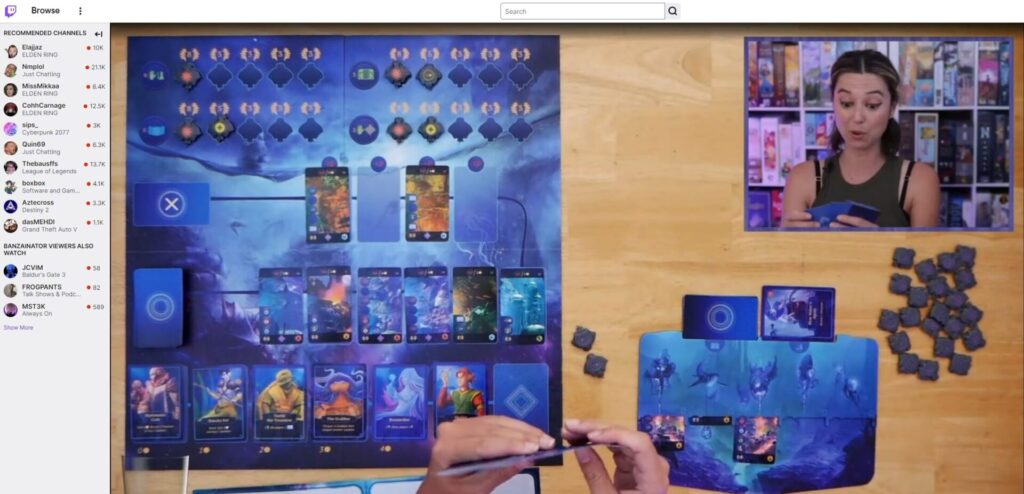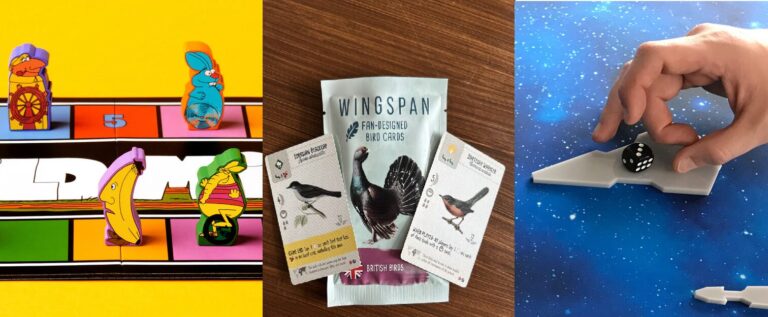
Bamboozled by board game Twitch? Professional streamer Banzainator’s top tips for working with influencers to make your campaign shine
Online streaming platforms have exploded in the last decade, with ballooning numbers of viewers tuning in to Twitch and other services to chat with their favourite presenters as they play games online. Board gaming is no exception, and a rising slate of influential streamers such as Beneeta Kaur and Amanda Panda provide a powerful new outlet to get games noticed amid the sea of new releases. But navigating this new technological territory and knowing how to get the best from a streamer campaign can be a minefield for designers and publishers. Professional streamer Banzainator, who has thousands of Twitch followers and also works as a community manager for Alderac Entertainment Group, shared with BoardGameWire her strategic advice for how to best work with streamers to get your game noticed.
I’m Banzainator, and I’m a board gamer who somehow landed in this industry creating content while having fun! Here are some things I’ve learned while freelancing – hopefully you can take away some tips and tricks for the next time you’re planning a campaign. Note: From my experience, working with larger, more corporate companies is a lot different – they’ll often have larger budgets, but will be more strict on what they need and will often have to get approval months in advance for content. I won’t be covering that side of things here. Instead, I’ll be focusing on smaller companies or individuals needing coverage for their games.
1. Be professional in your initial approach
Even though we’re on multiple social media channels, the best way to talk “work things” is by email. Look in the bio of the creator’s profile and see if they have any links or info on what their email is. Trying to do business in someone’s direct messages is a lot more common than it should be. DM’s get buried, it’s harder to organize, and can be hard to find for reference later.
Tip: A way to start that conversation if you can’t find an email is “Hello, my name is ___ with ___. We’re coming out with a new game and would like to send more info to see if you’re interested in working with us. We’d also like to get your rates. Thank you for your time!” You’ll get a much quicker answer if they know you’re not wanting free work.
2. Is your game actually ready for content creators?
It’s really helpful when a company sends a near-complete demo/pre-production copy of the game. I’ve gotten some games that were close to scraps of index cards and cardboard. It’s a nice thought, but it’s harder to create content of what the audience will get in the end.
3. “We can offer you a free game as payment!”
Expecting people to work for you for free is really bad, and really sad. The only time I’ve seen this work is offering a free game in exchange for nothing – no reviews, no photos, no posts, just giving a game to a person, and if they do something with it, they will. If not, no worries.
I’ve done a lot of free work and haven’t been bitter about it. I’ve also been insulted and cried over how companies did things because I could tell they were trying to take advantage of me. A good rule of thumb is: be transparent about what you’re offering, and if you’re offering no money, then be okay with people turning you down.
One of the “crying” experiences I had was when a company was seeking creators to work on their game. They seemed really excited about it, which made me want to work with them. We talked on what I would do, and they knew my rates. Then they ghosted me. After a few weeks they reached out again, said they decided to use their budget on other creators, but still wanted me to do everything we agreed upon for free, in exchange for their board game. They made it seem like they were doing me a favor. I cried really hard on that one. It made me feel like crap. I’m glad I didn’t end up working with them.
Thankfully, most of my experiences with publishers are positive ones. A lot of the people are chill and really nice, and some of them are fellow content creators, too.
Note: Doing paid reviews is a whole other topic, and can cross the line of being ethical. Receiving a review copy and doing a review for free is different from making sponsored content in a creative way to market a game.
4. Sometimes your game won’t fit a content creator’s style
For example, I dislike co-op games. I also have a hard time covering party games because I don’t have access to getting a lot of people to play it with to try it out. If I turn down your drinking/party/co-op game, it’s not you – it’s me. 😉
5. Not paying on time – or not paying at all
If you ghost other creators on payment, we will hear about it. We won’t know the story behind it all, even if the creator didn’t do a satisfactory job for you. But if you say you’re going to pay, and then don’t or have to be bugged over and over just to get the payment–we will hear about it. Word gets around and we won’t want to work with you. There are other companies we already like and respect who have work for us, and we won’t put up with any company that is like that.

6. Being clear on terms is good for everyone
It’s okay to ask questions, e.g. “Hey. I need some clarification on our plan. Is it okay if we schedule a quick Google Meet soon?” We know you’re human too, and we often have questions as well. Showing that you’re happy to ask for clarification on terms lets us know that we can be comfortable asking questions in return. We want to help you succeed – which is why we’re in this field.
I’ve been dealing with some minor burn out, and I often forget things. So I’ve been emailing back and forth with companies with timeline summaries, and notes if we had a video call. Having it in writing for both parties really helps.
7. Scheduling and timelines are necessary – don’t leave it to the last minute!
Sometimes we have events and content planned out months in advance. Right now I have a stream already scheduled for mid-August. If you have a timeline, know that we do too – because we’re working with companies just like you.
8. Rates and contracts
Content creators will usually have fixed rates but can be negotiable on what they charge based on what you want them to do. For example, if a creator is charging $300 for a video, they charge $300 for a video. Please do not ask them to lower their rates for you. However, you could ask if they charge for advertised static posts, and go with that if it fits better for your budget. Most creators know how to handle this and will make sure you’re not getting ripped off.
I recently lowered my rate for a company because they asked me several times to, saying they didn’t have a lot of money for marketing. Since then, I’ve seen content creators far and wide do content for their game, and I realized they probably sent that same message to everyone trying to squeeze out a deal. I’ve taken note and won’t be working with them again.
A different company asked me what my rates were and sent info about their game. I did research on them and realized their game was super simple, they weren’t asking for much, and it was just them doing all the work. I ended up offering a cheaper rate to them to help them out, and they were surprised and grateful. Again, we want to see you succeed.
Contracts and agreements: I have a contract, but use agreements more. I hired a lawyer just to write me a contract to use in this industry. However, there’s a lot of people I’ve worked with for years where we get everything done over email. But if I need a contract, I have it and use it.
When I send an invoice, I write an itemized list of what I’m doing with the due dates. I’m clear on what they’re paying for, and we make sure we’re both on the same page before I write the invoice. In this way, it’s an agreement, but not a contract. With larger companies there are contracts on both sides.
Contracts are also important for protecting creators and their time. For example, if the contract says the creator will not change the music they select for their video, you cannot ask them to change a song after they spend hours upon hours editing their video. Creators have a specific style they’ve used, and that’s why you’re hiring them. Asking for a bunch of changes after a final product is time consuming and aggravating. So contracts should state how many changes and what type of changes are allowed.
9. AI is a NO-NO
If you use it, I won’t work with you. Not only do I believe it’s not right, but my community also believes it’s not right. I need to protect myself and my brand, and your product isn’t worth putting my career at risk. If you use AI, I need to know right away. I will not take on work for any game that uses AI art.
10. Be kind
All of us are trying to pay our bills doing something we love. It’s so rewarding! This community can be wonderful. Contribute to it by being kind. It pays off. I always say, “work hard, play hard.” When you work your butt off making a great game, we can play it and tell the world about it. I work in this industry because I’m having fun and I’m somehow getting away with it in life. How am I still here? Sometimes I think I’m going to wake up and be in another cubicle filing digital forms. Yet here I am! I’m not making millions of dollars, but I’m close to racking up a million cumulative victory points. Be kind, and enjoy the ride.
Banzainator streams regularly on her Twitch channel here.







Red Flag #1 – Expecting people to work for you for free is really bad, and really sad.
As a content creator, I have no problem doing this… Guess I’m not in this for the money, but the love of the hobby…